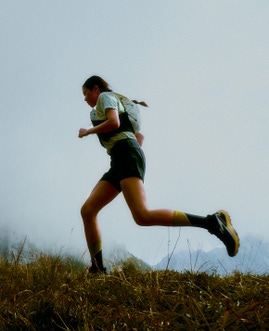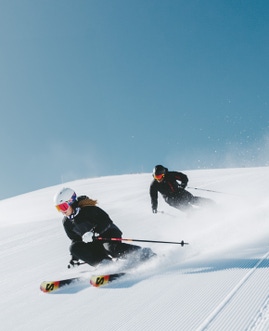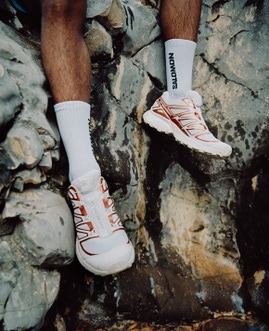Dr. Pierre Muller is a badass. There’s no other way to say it.
The 49-year-old is an experienced mountain guide, works as an emergency room doctor in Sallanches, near Chamonix, and is also a member of the French Alpine Rescue Team with the Gendarmerie in the Northern Alps. That means when he’s not working in the hospital E.R. he rides in helicopters and saves peoples’ lives when they’ve been injured in the mountains. Through the years, the Salomon ambassador has served as the team doctor for Salomon TV expeditions, first accompanying our crew and athletes to Svalberg, Norway for the “Eclipse” episode and to then to the Greenland ice sheet for the “Guilt Trip” episode. He’s climbed some of the biggest walls in the Alps—including the north face of the Eiger and the Matterhorn in winter—as well as peaks in Madagascar, the Sahara, Pakistan, and Yosemite. So, yeah, he’s a fit guy.
When you’ve spent a life going to places like these doing things like those, the last thing you expect is to be taken off your feet by a virus that leaves you close to death in your own bed in a matter of days. Still, just two weeks ago, Pierre found himself clinging to life by the slimmest of margins after contracting COVID-19.
“I returned home from work on Friday, March 20th and felt exhausted,” Pierre recalled this week. “I took my temperature and it was 39 degrees. I was 80 percent sure that I had the COVID because I was working around COVID patients earlier that week and it seems to have about a five-day incubation period. But I thought: I’m young and fit, so I will stay here in my bed and I will get past it.”
He isolated himself from his wife and infant son and spent the next seven days lying down. He was so tired he couldn’t move. Throughout that week, Pierre stayed in constant contact with his colleagues at the hospital where he works, updating them on his health. The next day, his condition went from bad to worse.
“On day eight, my breathing was becoming more difficult, so I went to the hospital and got a chest X-ray and blood samples, which confirmed that I had the COVID,” he said. Pierre’s chest scan showed that both sides of his lungs were highly infected and, due to a lack of oxygen in his blood, he needed a ventilator to help him breathe. “I needed oxygen,” he said. “It was like I was at 7,500 meters and I was very, very weak.”
In total, Pierre was sick for seven days at home and four more at the hospital. On day 12, his health began to improve and by day 14 he started to feel closer to normal. But he nearly didn’t make it.
“The critical days were between day seven and day 11,” he said. “Those are the days where you can really go to the dark side.”


As a doctor who has treated patients with COVID-19 and now suffered from it himself, Pierre is urging people to obey orders to isolate themselves for the immediate future. An obvious lover of the outdoors, he understands that being locked down is not easy for those of us who thrive on being active, but he wants to make it clear that the consequences are a matter of life and death, even if that life might not be yours.
“It’s the only way to save a life…by staying at home,” Pierre emphasized. “As more people get infected, the hospital will be overstressed and we just can’t handle more patients and using more respirators. I saw a projection of what would happen in France without the shutdown, and it’s estimated that we would have had 20 times more deaths. I know it looks like the middle ages with everyone staying inside, but it’s the only way we can flatten the curve. It may take a bit longer to get through the disease, but hospitals will be able to handle it this way. We don’t want everyone to get it within a few weeks. Even if only 10 percent of the population needs to come to the hospital, we will never have enough beds.”
If you are young and fit—as most runners, skiers, and hikers are—and under the impression that this means you are more tolerant to the disease, Pierre wants you to know the virus does not care about how far or fast you can run. At the hospital, he and his colleagues have treated patients in worse condition than him, and some are young and very fit.
“Nobody is invincible,” Pierre warned. “When you feel sick, you shouldn’t test yourself and you shouldn’t train. Don’t push. This virus also goes to the heart and it can destroy the heart, so take it seriously even if you are a young person. And if you are fit and young, maybe you won’t get bad symptoms or even know you have it, but you could carry the virus and transfer it to someone who is weaker than you who could get much sicker than you. The only way to save a life is to stay away from each other.”
The unpredictable nature of the virus has also been alarming for Pierre and other medical professionals. For example, a patient might have only moderate symptoms one minute, then become extremely sick and on the verge of death just a few hours later.
“You see someone who is ok, so they go home. Then they call back a few hours later and say they cannot breathe, so we tell them to come back in and then they need a ventilator because they might die without it,” Pierre explained. “It’s super hard to predict and it depends on your personal reaction to the virus.”
Having volunteered his services for non-profit organizations in Iraq and handled refugee situations, Pierre said this pandemic is not something he ever expected to see in France or other first world countries. “It’s very shocking to me and it’s nothing you study in medical school,” he says. “Today we have a hospital working like it would in a country at war.”
When it comes time to play outside again, Pierre expects life to be slightly different for a while, with people needing to avoid close contact in places like mountain huts and even offices.
“When they open the doors to go back to work and play, we have to behave in a very smart way,” he said. “You will probably have to wear a mask not just to protect yourself, but the rest of the world. I’m encouraged and feeling positive today because most people I see at the hospital are very respectful. They trust us and they respect the rules and we will all have to continue to do so.”
When we spoke with Pierre, he had just held his three-month-old son for the first time in several weeks due to his illness, but he was planning to work a 10-hour shift at the hospital the following day. His skills are needed to help treat more COVID-19 patients who are in the same situation he found himself in just a few days ago. Pierre will have to be careful not to bring the virus home with him from the hospital. He will shower at work before he departs, he won’t wear a watch, he’ll leave his shoes outside the door at home, shower again when he arrives home and wash his clothes immediately. Thankfully, both his wife and son are healthy, but Pierre knew he would soon be back in the middle of the fight, which will likely last for weeks to come.
“Tomorrow,” he said, “I go back to work.”
As a small token of our appreciation for the work being done by healthcare professionals like Pierre on the frontlines of the fight against COVID-19, Salomon has donated RX Slide footwear and compression socks to the medical staff at French hospitals in Lyon, Paris, Mulhouse, Chambéry, Marseille and our hometown of Annecy. Salomon worked with hospital organizations in these cities that have been profoundly impacted by this health crisis to be sure this footwear is approved for use in these medical environments and we hope the footwear provides some added comfort for the brave people who are standing on their feet for the rest of us.















